A nostalgic smile crosses Moscholiou’s face as she reminisces about her childhood in Agia Varvara, a neighbourhood of Egaleo, one of the city’s poorer suburbs. ‘It was then countryside, all pine and almond trees. It wasn’t built up the way it is now. There were hardly ten houses in all of Agia Varvara. I’d sit on the mountain and sing by myself! Sometimes the other neighbourhood kids would gather there and I would sing to them. It was so quiet I could be heard some two kilometres away.’
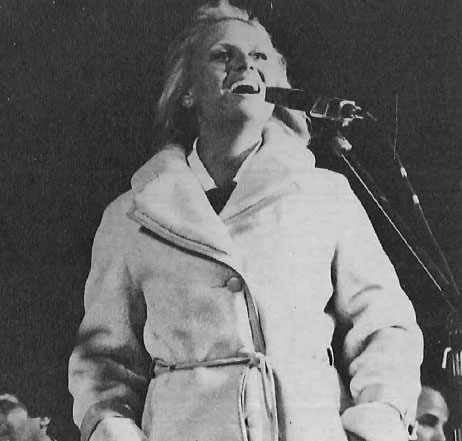
We were sitting at a table in Neraida, the fashionable seaside nightclub where Moscholiou was performing last summer. Ί liked to sing from a very young age. My father was a great music enthusiast, and we had many popular records in our home. Anything I heard, I sang! Time passed, we grew up… I remember when my father took our records and gramophone to an auction mart so he could buy a suit for my brother. But later we got a radio and I could listen again to the singers.’
Our conversation is interrupted by a waiter who brings us a demi-tasse of coffee — and a bottle of mineral water. She does not drink alcohol, but nero loutrakiou is ever-present. She would not be performing for another hour. I ask how she got started in her singing career. ‘We were in great need. My mother and father were both sick, and it became necessary for me, the oldest in the family, to make ends meet.’ She had first gone out to work in her early teens as a kordelistra, a trimmer, lining and piecing together the upper parts of shoes. She earned fifty drachmas a day, hardly enough to support her entire family of seven—her parents, the three other children, and her grandmother. A cousin, Effie Linda, was, at the time, singing at the bouzoukia, and suggested to her mother that Vicky, too, become a singer, pointing out that she would earn more money and have a better future. Mr. Moscholiou, however, was firmly set against the idea. ‘Och!’ she remembers him exclaiming, ‘they are going to make her a bouzouxou!’ Bouzouki singers, as far as he was concerned, had ‘a bad name’. His daughter pleaded with him, promising that her behaviour would be above reproach, and he eventually relented, but not without a final, ominous warning. ‘If you ever touch a cigarette or cards,’ he told his young daughter, ‘my curse will be on you.’
I look at the cigarette she is holding, a very rare sight since Moscholiou seldom smokes, and we laugh. She quickly grows serious again and explains. ‘But he did not object to cigarettes. He thought if I smoked cigarettes, I might start smoking something else\ You know. And cards. He had heard that singers gambled.’ To this day she has never played cards. ‘Not because my father had said not to, but because I don’t like them,’ she adds.
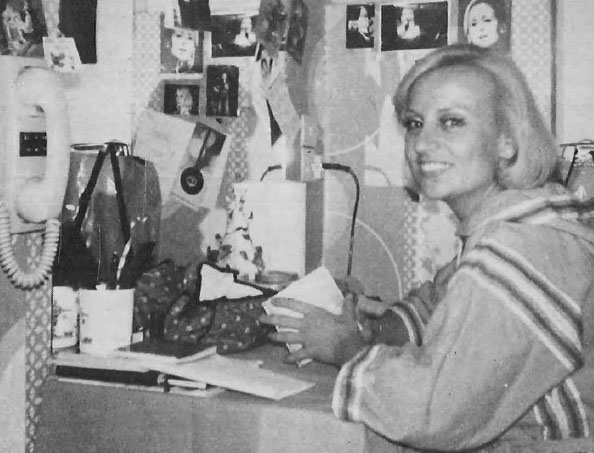
On Easter day in 1962 Vicky Moscholiou made her first public appearance at one of the city’s then most-popular nightclubs, the Trianna Tou Hila on Syngrou Avenue. The show starred the late Tzouenakos and Doukissa, both established singers, and Grigoris Bithikotsis, who was at the height of his career. ‘And me? I was just a kid!’ Moscholiou exclaims. ‘Yes, that was my first appearance, and I wasn’t bad looking,’ she modestly recalls with a broad smile. ‘My boss joked and said, “It doesn’t matter if she sings or not, as long as she’s on stage for the audience to see.” ‘ Bithikotsis lived in Peristeri, a working-class suburb of Athens. Her home, in Egaleo, involved a detour but, she recalls, ‘The dear soul would take me home every morning so I wouldn’t spend money on a cab. There was no bus service at’ that hour.’ Her first salary? Only one hundred drachmas. One hundred drachmas and I would get up. on the stage at nine o’clock and stay there until four-thirty in the morning. We never left our chairs the whole time!’ she explains. Just as today, second string performers then sat in a row across the stage, occasionally singing, but mostly providing back up, ‘to fill the palko —the stage—and to clap for the stars. Ί worked very hard to get where I am today.”
It was at Trianna Tou Hila, on the following Christmas, that she first met the young soccer player, Mimis Domazos. Their careers soared simultaneously. By the time they were married in 1967, they were both stars in their respective fields, and their marriage was a major event. Today, Domazos is considered to be one of Europe’s outstanding soccer players and has been dubbed, ‘The Soccer King of Greece’. Despite demanding careers, they have maintained a warm family life, a fact that Moscholiou partially attributes to their separate professions. Ί am a singer and Mimis is an athlete, and we are each a “star” during our work, but not at home. At home it’s “Mimis” and it’s “Vicky”, a couple, like all couples. If we were in the same field, I don’t know if there would be jealousy between us. That I can’t know.’
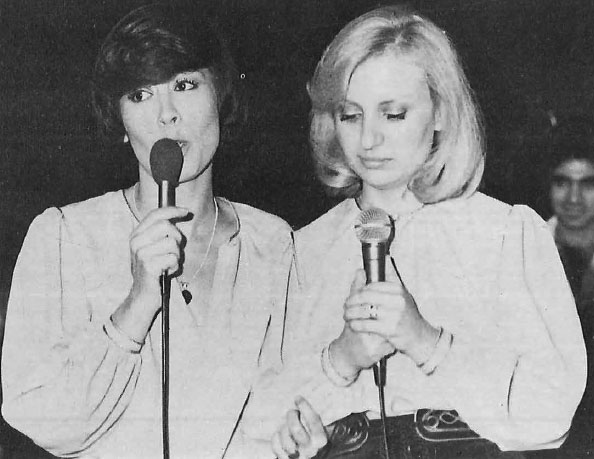
Success came early to Moscholiou. Although her voice had yet to develop the sonorous, earthy quality that is the Moscholiou trademark, early in her career Tzouenakos was impressed with its vibrant colour and took her to Columbia Records to cut a demonstration record of one of his own compositions, ‘Na Ixeres Poso Ponesa’. Two hundred and fifty copies were made of that first record, which is no longer available. In 1964 she met composer Stavros Xarhakos for the first time when she visited the set of a film for which he had written the score. He did not hear her sing, however, until sometime later when he visited the nightclub. He was in search of a singer to perform the theme song for another movie, Lola. Her appearance in Lola and the song, ‘Hathike to Fengari‘, catapulted her into fame. (Another Xarhakos song, ‘Ta Traina’, first sung by Moscholiou in 1964, won the composer a golden record award in New Zealand ten years later.)
Moscholiou continues to appear in films, on television, and clubs in Athens, and has toured all of Greece. She has given concerts at the Royal Albert Hall in London, sung in New York nightclubs, and made appearances in Australia and Africa. Having risen to the top, she has remained there. This is the result of ‘a great voice and much soul’, according to singer Dimitra Galani. Ί grew up with Vicky Moscholiou’s songs’, Galani says. ‘She was established a decade before I was, and that decade was the golden decade of Greek song. The 1960s. She sang the best songs ever written by Greek composers Theodorakis, Hadzidakis, Xarhakos, Moutsis.’ Although Moscholiou’s voice is not formally trained, Galani notes, it has a natural, primitive quality.
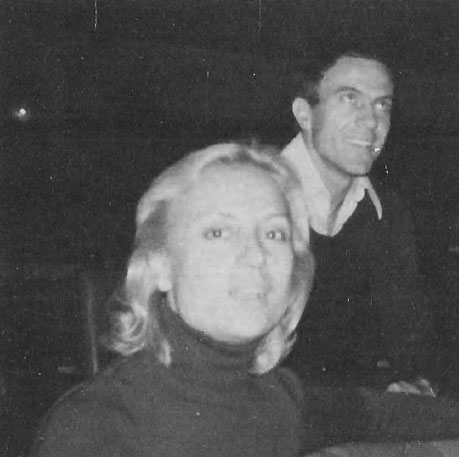
Moscholiou has continued to work with those composers as well as Yannis Spanos, Giorgos Hadzinassios and Yannis Markopoulos, whose album / Metanastes (The Immigrants) recently earned her a gold record. ‘She is solid and strong-charactered,’ says Vasilios Doubakarios, the managing director of Columbia-Emial records in Greece, who has worked with her since her first days at Emial. ‘We have had the best possible working relationship. I can even say it’s been the best artistic relationship we’ve had here. She “grew up” here at Emial.’
Moscholiou works steadily and relentlessly. Last summer she appeared six nights a week from one until four a.m. at the Neraida where she presented two programs, one of her hit songs and a second of contemporary and traditional laiko songs. On Monday nights this was preceded by her participation in two shows of rebetika songs organized by Stavros Xarhakos at the Delphinarium, in Piraeus. On Sunday nights, when the Neraida was closed, she gave recitals in Alexandroupolis and on the island of Rhodes. In between this demanding schedule, which would have exhausted most performers, she rehearsed new songs for record albums to be made with Stavros Xarhakos and Yannis Spanos, gave two weekend concerts in Thessaloniki, participated in a benefit concert, taped programs for television, and prepared her new show which opened at Zygos in October.
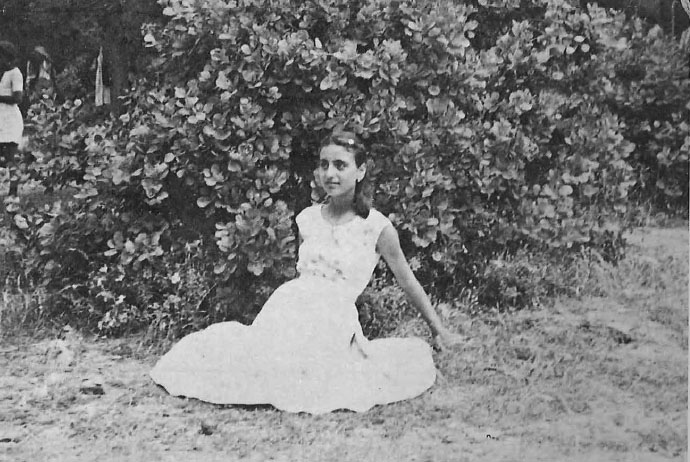
Those familiar with the local music scene say that opening her own boite in the Plaka was a wise move. She first appeared in the Plaka at Zoom during the 1972-1973 season and opened Zygos, which she runs with her husband and another partner, the following year. This year, October 18, press night at Zygos, was the occasion for another celebration when it was announced that Moscholiou had been selected to appear on a BBC Christmas Special to include, among others, Tom Jones, Shirley Bassey and Frank Sinatra.
Despite a full schedule, Moscholiou spends as much time as possible with her family. It is a quiet home-oriented life, warm and informal, a reflection of herself. Rania, ten, and Evangelitsa, nine, are having a French lesson as we talk one afternoon at her home. Her husband is at the stadium practising with his team. She is sitting in the corner of her favourite sofa with a blue telephone nearby, ready for the inevitable calls. Rania and Evangelitsa, playful, outgoing, and well-mannered, pop in and out during breaks for a quick hug from their mother, to ask her questions or for a snack — invariably fruit since sweets are discouraged. ‘I’m good friends with my girls. We don’t see each other very much and I try to make them understand that life is difficult, that we must all work. Sometimes they complain to me. “Stav home from work, Mama, so we can see you.” ‘ Her family and her way of life mean a great deal to her.
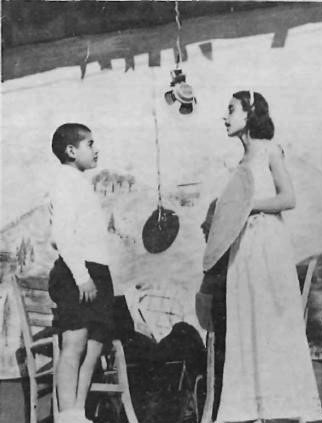
Speaking of her enduring success, she says, ‘It isn’t only my voice or the talent that they sayl have.’ She smiles. Ί respect my work and I respect my public. I try to interpret the songs of the best composers, to select my songs. I always try to offer something better to the people. And people respect me and the way I live. I look after my home, my husband, my children and my parents. All the things people revere.’
Dimitra Galani, a brilliant singer of light, popular songs, worked closely with Moscholiou as her co-star at Zygos last year, and at Neraida this summer. ‘She’s a simple girl who came from simple parents and married a good man’, she says of Moscholiou. ‘All these things nourish a person. Rarely do you see a thriving star with a good family situation. A very rare thing! Vicky is perhaps the only one who has achieved this. A solid marriage, well brought up children, and at the same time Vicky and Mimi are both so good in their work. I think her goodness is due to the warm environment in which they live. Vicky does not have an open circle. She spends most of her spare time with her family . . . these things nourish and protect her.’
Galani has had a very good working relationship with Moscholiou. The word ‘solid’ comes up again. ‘She is of such a solid character and so frank and sincere. She’s a genuine and innocent person who tries to protect herself from the corrupting influences around her. And because she’s such an innocent being, coming from the background she did, she doesn’t have the facility to be diplomatic, you know. Anything she has to tell you, she’ll tell you straight.’
Galani recalls an incident last year at Zygos when she and Moscholiou were appearing together. They had agreed that their names on the marquee would appear separately on two billboards of the same size. Galani considered this a great honour because, ‘Moscholiou has been a star for many more years.’ To accommodate the longer name, Moscholiou’s billboard turned out to be longer, but Galani attached no importance to this. ‘My name is Galani and I can’t make it any longer!’ she comments. When Moscholiou noticed it, however, she was furious. Her husband and their partner were summoned and she insisted the signs be adjusted. ‘Vicky gave them a very rough time because my name was smaller than her own!’ notes the young singer. Thus the letters in ‘Galani’ were spaced farther apart to cover as much space as ‘Moscholiou’. Galani reflects, ‘That’s one example of a very big person.’
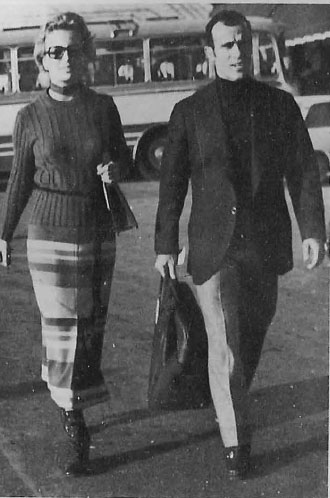
In a quiet, resolute way, Moscholiou is always in total command. She is quick to acknowledge what she does not know and eager to learn something new. She moves calmly from one task to the next, focusing on the job at hand. I arrive on the afternoon of the opening of her new show at Zygos, just as the priest is bringing to a close the Ayiasmos, the ritual ceremony blessing, in this case, the new season. A few minutes later, Moscholiou was having a manicure and pedicure. The marquee is going up, tables are being set, food preparations are underway, adjustments are being made to the microphones, people come and go. Yet the atmosphere is relaxed. Her nails dry, Moscholiou moves to the front of the club to check final details of lighting. When she returns, we leave together. It is drizzling outside, and we pause while she examines the marquee. She is pleased. She hopes the new style letters are easy to read. I remember Galani’s story of last year’s marquee.
In the car on the way to her home she talks about the show, and goes over the lyrics to her newest song. Her concentration is total. It is about four in the afternoon and the drizzle continues. As we approach her flat below Lykavittos, we can smell the pines. Lykavittos looks fresh in the afternoon mist. She is still going over her songs. Upstairs the children are waiting at the door for her. It is busy, but so low-keyed that I wonder if it is really opening night.
Press night on the following week, with reporters in attendance, is more tense. Has she ever had stage fright? ‘Many times’, she says, ‘but not to the extent that I can’t sing. At concerts, when we’re presenting something special, when there are people below ready to judge you at any moment. It’s not how I will sing the song, but how people will accept what I am presenting. My heart races until I go out on stage, until part of the first song, and then it’s gone! But is there a better experience for a singer than singing? Who can teach you? I’ve never had professional training, never.
‘Sometimes people ask me if I get tired singing all night, but I don’t,’ says Moscholiou. My breathing, I learned by myself, from experience, every night, every night… by instinct.’ She neither drinks nor needs any stimulants before performances. Ί get my kefi when I hear my voice coming strong and clear through the microphone and I can control it and do different colourings. I get irritated when the microphone is scratchy.’
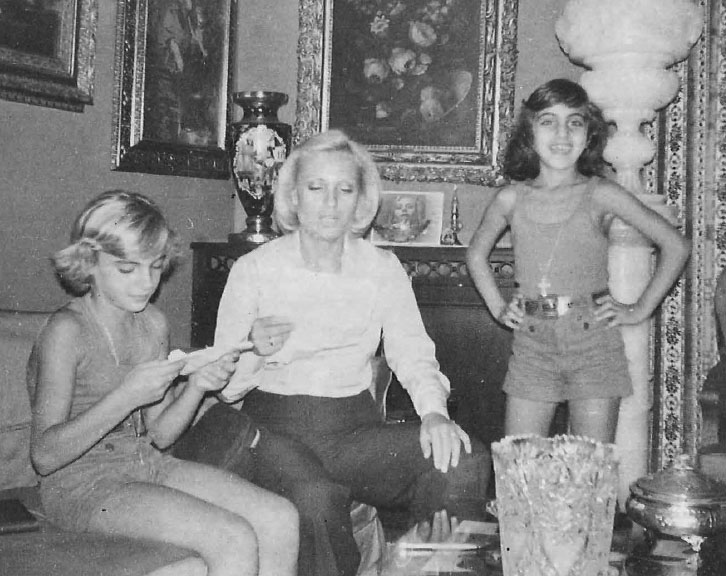
Moscholiou strives for perfection in whatever she undertakes and is impatient to learn. She recently decided to take up tennis and asks me how long it will take to learn to play well. She laughs and admits her impatience when I comment that she wants to have learned ‘by yesterday!’ Nevertheless, the lessons have begun and continue three times a week despite her many commitments. She has just returned from a tennis lesson and we are looking at a collection of icons which line the walls of the dining room. She speaks of her strong religious beliefs. Under the influence of an older cousin, she changed, ten years ago, to the Old Calendar rites of the Orthodox religion which follow the Julian Calendar. 1 wish I had been born and baptized by the Old Calendar’, she says wistfully, adding that people have misunderstood her religious conviction. ‘Artists may be very religious, but it doesn’t show because of the work they do. “A singer”, they say condescendingly. They don’t believe that we can be good mothers, or religious. Just because two or three female singers happen to have a bad name, it tends to reflect on us all. That is true in other professions, too, isn’t it? But because we are seen more in the public eye, people find it hard to believe.’
Roubini and Keti, who look after the house and the children, join us when they are not busy with housework. They are an integral part of the family. It is difficult to find good friends, Moscholiou explains. ‘It doesn’t matter to me if one is a “star” or “wealthy”. What is of most importance to me is that my friends be good company and that we get along. Roubini and Keti are my friends.’ The telephone rings. It is Stavros Xarhakos calling to discuss their forthcoming album. Vicky Moscholiou has come a long way since filling the palko for others.







